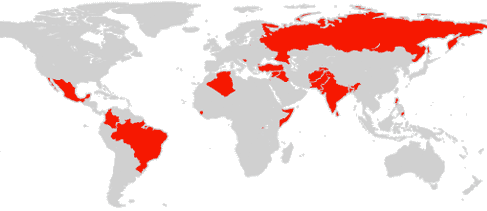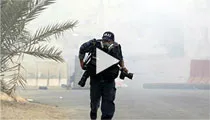Long-standing antagonism between Prime Minister Sheikh Hasina Wajed’s Awami League and the opposition Bangladesh National Party—what critics call “zero-sum politics”—set off street violence that threatened the safety of journalists. A constitutional amendment eliminated the creation of caretaker governments to oversee general elections, a step likely to intensify political passions surrounding the scheduled 2013 vote. The Bangladesh National Party called for political agitation and suggested it may boycott the election. The amendment also criminalized criticism of the constitution itself, labeling such dissent as sedition. A group of machete-wielding assailants killed Jamal Uddin, a reporter who covered the drug trade for a Bengali-language newspaper in Jessore district. The June slaying ended a nearly seven-year period in which no Bangladeshi journalist had been killed in direct relation to journalism. Mystery surrounded the double murder of married journalists Meherun Runi and Golam Mustofa Sarowar. The authorities made arrests in the case but disclosed no motive. CPJ is investigating to determine whether the double slaying was work-related.
Bangladesh
» Deadly violence re-emerges, ending a period in which no journalist was killed.
» Journalists caught in decades-old political standoff between political parties.
Long-standing antagonism between Prime Minister Sheikh Hasina Wajed’s Awami League and the opposition Bangladesh National Party—what critics call “zero-sum politics”—set off street violence that threatened the safety of journalists. A constitutional amendment eliminated the creation of caretaker governments to oversee general elections, a step likely to intensify political passions surrounding the scheduled 2013 vote. The Bangladesh National Party called for political agitation and suggested it may boycott the election. The amendment also criminalized criticism of the constitution itself, labeling such dissent as sedition. A group of machete-wielding assailants killed Jamal Uddin, a reporter who covered the drug trade for a Bengali-language newspaper in Jessore district. The June slaying ended a nearly seven-year period in which no Bangladeshi journalist had been killed in direct relation to journalism. Mystery surrounded the double murder of married journalists Meherun Runi and Golam Mustofa Sarowar. The authorities made arrests in the case but disclosed no motive. CPJ is investigating to determine whether the double slaying was work-related.
Police made one arrest in the fatal attack on reporter Jamal Uddin. But arrests have not always led to justice in Bangladesh, where the authorities have a generally poor record of winning convictions in journalist murders. Nine journalist murders are unsolved since 1992.
| 75% | Complete impunity |
| 17% | Partial justice |
| 8% | Full justice |
Note: Partial justice means at least one person has been convicted, but other conspirators have not. Full justice means all conspirators have been convicted.
With 13 journalists killed in direct relation to their work, Bangladesh is the world's 19th deadliest country for the press since 1992, according to CPJ data. Six other journalists have been killed in unclear circumstances, including Runi and Sarowar.

| 1. Iraq: 151 2. Philippines: 73 3. Algeria: 60 4. Russia: 54 5. Somalia: 48 6. Pakistan: 48 7. Colombia: 44 | 8. Syria: 30 9. India: 29 10. Mexico: 28 11. Brazil: 24 12. Afghanistan: 24 13. Turkey: 20 14. Bosnia: 19 | 15. Sri Lanka: 19 16. Tajikistan: 17 17. Rwanda: 17 18. Sierra Leone: 16 19. Bangladesh: 13 20. Israel and the Occupied Palestinian Territory: 12 |
Reporters who cover crime are particularly vulnerable to attack in Bangladesh. Among those killed since 1992, more than three-quarters had covered the crime beat. Corruption and politics were also risky beats.
| 77% | Crime |
| 46% | Corruption |
| 31% | Politics |
| 8% | Human Rights |
| 8% | Business |
* Adds up to more than 100 percent because more than one category applies in some cases.
Hasina Wajed, head of the Awami League, and Khaleda Zia, who leads the Bangladesh Nationalist Party, have traded power for two decades. Wajed has familial ties to the independence movement; Zia to a former military-run government.
1972-75: | Mujibur Rahman, the country's first prime minister, is in power until his assassination in 1975. Hasina Wajed, the prime minister in 2012, is his daughter. |
1975-1981: | Successive military coups resulted in the army chief of staff, Gen. Ziaur Rahman, becoming leader. Rahman was assassinated in May 1981. Power struggles continued into 1982. |
1982-90: | Lt. Gen. H.M. Ershad, also an army chief of staff, assumes power in a coup in March. The constitution is suspended and martial law declared. |
1996-2001: | Khaleda Zia, widow of Ziaur Rahman, becomes prime minister. |
1996-2001: | Wajed assumes power as prime minister. |
2001-2006: | Zia becomes prime minister again. |
2006-2009: | A caretaker government is in power. |
2009-12: | Wajed takes office as prime minister again. |

